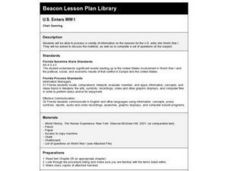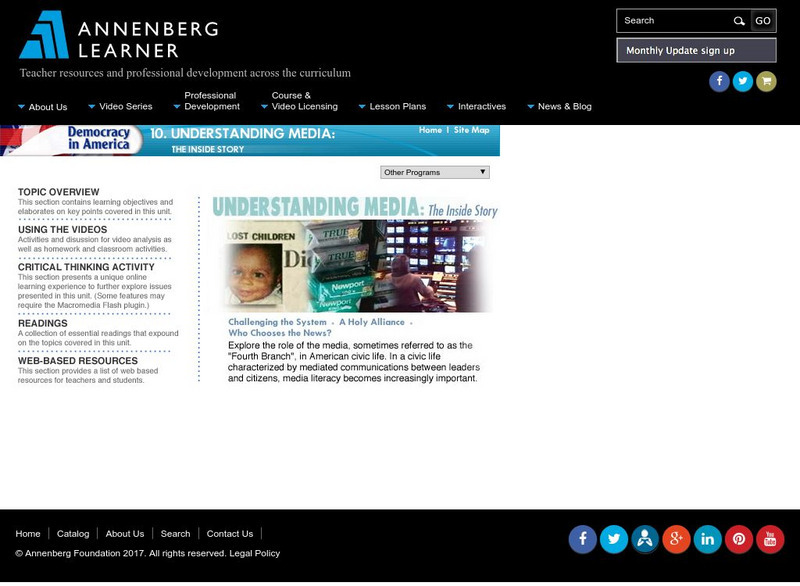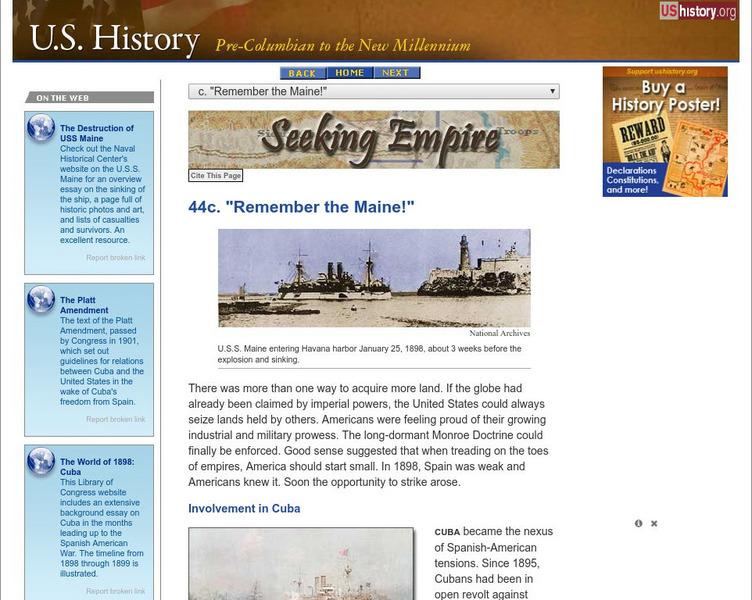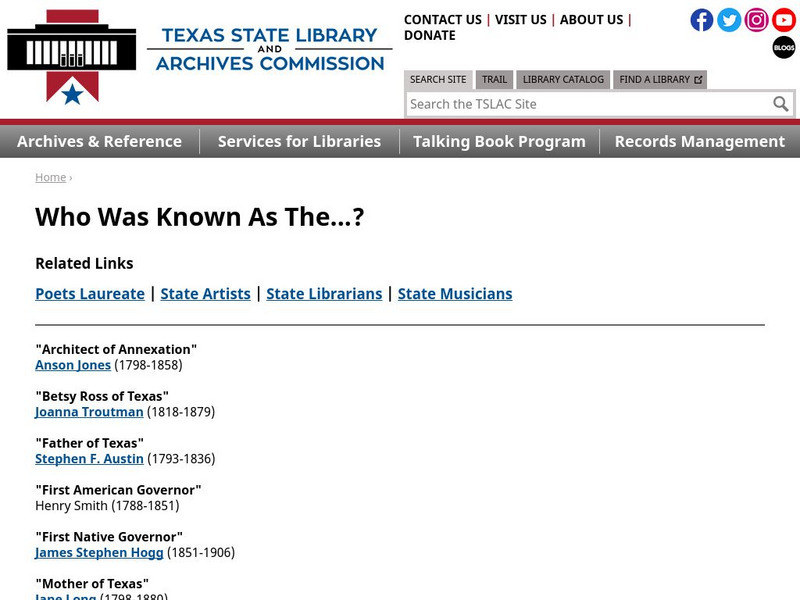Curated OER
The Imperial Republic: 1865-1914 (5)
In this online interactive social studies activity, students answer 14 matching questions regarding the Imperial Republic. Students may submit their answers to be scored.
Curated OER
Spanish-American War
Students view a video called Battling Beyond the Borders about the Spanish-American War. They discuss the role of newspapers in the war and then analyze political cartoons of the time, writing explanatory sentences about them.
Curated OER
U.S. Enters World War I
Students explore the reasons why the United States entered into World War I and how that conflict effected the United States and Europe politically, economically and socially.
PBS
Crucible of Empire: Yellow Journalism
Discusses "yellow journalism" and its impact on the Spanish- American War.
PBS
Pbs: Yellow Journalism and Fake News: Joseph Pulitzer: Voice of the People
Learn about the rise of yellow journalism and the fine if occasionally wavering line between sensationalism and fake news in this series of videos from the American Masters film Joseph Pulitzer: Voice of the People. Learn about the...
Digital Public Library of America
Dpla: Fake News in the 1890s: Yellow Journalism
The illustrations, photographs, cartoons, and posters arranged in this primary source set trace the origins of yellow journalism. Teaching guide included.
US Department of State
Office of the Historian: u.s. Diplomacy and Yellow Journalism
"You furnish the pictures, I'll provide the war!" was a quote said by William Randolph Hearst in the time leading up to the Spanish-American War. Learn how yellow journalism led to international conflict and was one cause of the...
University of Florida
A Brief History of Newspapers in America: Yellow Journalism
Read a brief explanation of yellow journalism which began as a competition between Joseph Pulitizer and William Randolph Hearst to see which of their papers could sell more copies based on sensationalized stories. See how the involvement...
Other
Yellow Journalism and James Creelman
Frederick A. Moritz tells the biography of a yellow journalist, James Creelman. Learn more about yellow journalism during the Spanish-American War and the Sino-Japanese Wars and the impact yellow journalism played in world affairs.
PBS
Crucible of Empire: Yellow Journalism
As part of a larger site about the Spanish-American War, this article talks about the advent of "yellow journalism" and its role in pushing the war on the American public.
Other
Joseph Pulitzer and His Prize:defining Yellow Journalism:competition With Hearst
Provides information about Joseph Pulitzer and William Randolph Hearst and their development of "yellow journalism" in their attempt to increase the circulation of their respective newspapers.
Patrick McSherry
Spanish American War Centennial: Black, White, and Yellow
This site contains information on the type of journalism that the press used during the Spanish-American War. It includes a brief history of how yellow journalism influenced the Spanish-American War.
PBS
Pbs Learning Media: Why Is Fake News So Effective?
This activity frames the controversial issues of fake news and trust in the media with the historical context of yellow journalism and sensationalist reporting. Students learn strategies for improving their media literacy and will be...
Curated OER
Yellow Journalism and James Creelman
Frederick A. Moritz tells the biography of a yellow journalist, James Creelman. Learn more about yellow journalism during the Spanish-American War and the Sino-Japanese Wars and the impact yellow journalism played in world affairs.
University of Groningen
American History: Essays: Manifest Destiny: Many Shades of Manifest Destiny
A discussion of the other guises of Manifest Destiny, including imperialism, yellow journalism, the idea of the white man's burden, the Monroe Doctrine, and the Roosevelt Corollary.
ClassFlow
Class Flow: Sensational Journalism and the Yellow Kid
[Free Registration/Login Required] This flipchart covers the use of sensational journalism and the first comic strip cartoon known as the Yellow Kid. It is focused on the time around the Spanish American War.
Annenberg Foundation
Annenberg Learner: Democracy in America: Understanding Media: The Inside Story
This unit highlights the integral role that the media plays in American politics to communicate between the leaders and the public. Offers video, readings, web resources, and activities.
Independence Hall Association
U.s. History: "Remember the Maine!"
See how yellow journalism that reported on the mistreatment of Cuban rebels by the Spanish helped to push the United States into war. Read about the sinking of the USS Maine and the beginning of the Spanish-American War.
Federal Bureau of Investigation
Fbi: Freedom of Information Act Reading: Walter Winchell
Interesting site with over 3900 pages of FBI documents regarding yellow journalist. Scans of the actual documents are presented.
PBS
Pbs Learning Media: Writing in u.s. History: Imperialism and Spanish American War
Trace the causes and debates that led to the Spanish-American War, including "yellow journalism" press coverage, President McKinley's declaration of war, and sentiments about imperialism. In this interactive lesson from WGBH, students...
Wikimedia
Wikipedia: Joseph Pulitzer
Wikipedia provides biographical information on Joseph Pulitzer (1847-1911), an American newspaper publisher. The Pulitzer Prize was set up by his will.
Bartleby
Bartleby.com: Newspapers Since 1860
A short summation of how Hearst and Pulitzer shaped the newspapers of their day by adding new features that would appeal to the populace.
Texas State Library and Archives Commission
Texas State Library and Archives Commission: Who Was Known as The...?
Who Was Known As the Father of Texas? Who Was Known As the Yellow Rose of Texas? This resource identifies a selection of famous people from Texas history, and provides a biography for each.
Patrick McSherry
Spanish American War Centennial: William Randolph Hearst
This site contains a short biography, political cartoon, and photo of Hearst, detailing his rise in journalism in the late 19th and 20th centuries.


















